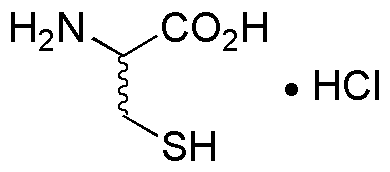DL-Cysteine hydrochloride is widely utilized in research focused on:
- Pharmaceutical Development: It serves as a precursor for the synthesis of various pharmaceuticals, enhancing drug efficacy and stability.
- Antioxidant Formulations: Commonly used in dietary supplements, it helps combat oxidative stress, promoting overall health and wellness.
- Food Industry: Acts as a flavor enhancer and preservative, improving the quality and shelf-life of processed foods.
- Cosmetic Products: Incorporated into skincare formulations for its skin-repairing properties, helping to maintain skin elasticity and hydration.
- Biotechnology: Essential in cell culture media, it supports cell growth and viability, making it crucial for research in cellular biology.
General Information
Properties
Safety and Regulations
Applications
DL-Cysteine hydrochloride is widely utilized in research focused on:
- Pharmaceutical Development: It serves as a precursor for the synthesis of various pharmaceuticals, enhancing drug efficacy and stability.
- Antioxidant Formulations: Commonly used in dietary supplements, it helps combat oxidative stress, promoting overall health and wellness.
- Food Industry: Acts as a flavor enhancer and preservative, improving the quality and shelf-life of processed foods.
- Cosmetic Products: Incorporated into skincare formulations for its skin-repairing properties, helping to maintain skin elasticity and hydration.
- Biotechnology: Essential in cell culture media, it supports cell growth and viability, making it crucial for research in cellular biology.
Documents
Safety Data Sheets (SDS)
The SDS provides comprehensive safety information on handling, storage, and disposal of the product.
Product Specification (PS)
The PS provides a comprehensive breakdown of the product’s properties, including chemical composition, physical state, purity, and storage requirements. It also details acceptable quality ranges and the product's intended applications.
Certificates of Analysis (COA)
Search for Certificates of Analysis (COA) by entering the products Lot Number. Lot and Batch Numbers can be found on a product’s label following the words ‘Lot’ or ‘Batch’.
*Catalog Number
*Lot Number
Certificates Of Origin (COO)
This COO confirms the country where the product was manufactured, and also details the materials and components used in it and whether it is derived from natural, synthetic, or other specific sources. This certificate may be required for customs, trade, and regulatory compliance.
*Catalog Number
*Lot Number
Safety Data Sheets (SDS)
The SDS provides comprehensive safety information on handling, storage, and disposal of the product.
DownloadProduct Specification (PS)
The PS provides a comprehensive breakdown of the product’s properties, including chemical composition, physical state, purity, and storage requirements. It also details acceptable quality ranges and the product's intended applications.
DownloadCertificates of Analysis (COA)
Search for Certificates of Analysis (COA) by entering the products Lot Number. Lot and Batch Numbers can be found on a product’s label following the words ‘Lot’ or ‘Batch’.
*Catalog Number
*Lot Number
Certificates Of Origin (COO)
This COO confirms the country where the product was manufactured, and also details the materials and components used in it and whether it is derived from natural, synthetic, or other specific sources. This certificate may be required for customs, trade, and regulatory compliance.

